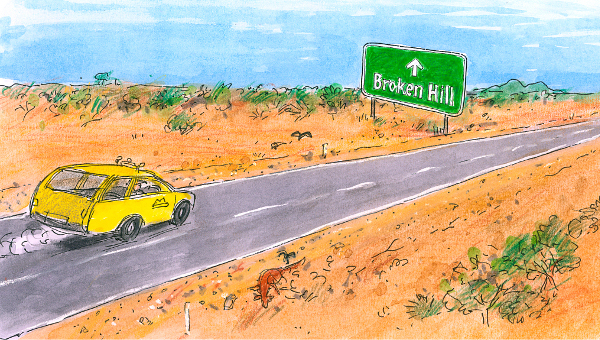When told he doesn't have long to live, Rex, the loner taxi-driver in the recent film Last Cab to Darwin, embarks on an epic drive through the outback from Broken Hill to die on his own terms in the jurisdiction where euthanasia is soon to become legal.
However, his journey reveals to him that before you can end your life, you have to live it, and to live it, you've got to share it.
After seeing this thoughtful film I attended a Q&A with legendary Australian actor Michael Caton who played the role of Rex. One of the questions asked was “is this a movie about euthanasia?” His reply was “no, it’s about a journey and transcendence”.
A strong theme in the film is the way a person can change at any stage of their life’s journey even when they come to accept that their life is terminal (and isn’t life a terminal condition?). Rex’s self-transcendence from not wanting to be a burden on others as he left on his journey to ultimately abandoning that idea and returning to a new life of re-uniting with his lover, friends and community.
The characters he meets and the incidental ‘palliative care’ he receives from them changed his persona from being a cantankerous old man to warmly re-connecting with the people he had previously shared his insular life with. He seems to transcend into someone who has just discovered a new meaning in life. Such an existential change was spurred on by friends, acquaintances, experiences and a caring nurse.
This story is topical as the controversial euthanasia debate rolls on, peaking regularly in the public domain. For instance, public figure Andrew Denton travelled to Oregon, Belgium and the Netherlands to explore different and legal approaches to end of life challenges, and has become a strong advocate for voluntary euthanasia.
Euthanasia is intentionally killing another person to relieve their suffering. It is not the withdrawal or withholding of treatment that results in death, or necessary pain and symptom relief treatment that might shorten life, if that is the only effective treatment.
So why has this alternative become one that many in our society feel a need to promote? In the past the taking of another's life was totally unacceptable to even contemplate, except perhaps in the event of self defence. Now the populist opinion of strongly advocating legalising euthanasia has some political, albeit controversial, support.
Well respected Australian ethicist Margaret Somerville, Founding Director for the Centre for Medicine, Ethics and Law at McGill University in Montreal has strong anti-euthanasia views. Despite major advances in palliative medicine, including pain and symptom control for end of life care, she suggests there are post-modern, secular, Western democratic societies that have brought about change that we should take into account when considering the context of this debate. In explaining why this debate is now re-emerging she cites some of the following relevant trends:-
Mystery: we are frightened of the mystery of death and the feeling of loss of control, and convert this to the ‘problem of death’ that needs to be ‘dealt with’ to reduce anxiety – euthanasia is seen as the solution.
What it means to be human: we ‘put down’ our dog or our cat when they are terminal and suffering, so why not the same for humans as animal rights philosopher Peter Singer would suggest. Others suggest we deserve special respect because we are human.
Mass media: the debate tends to be media driven, with coverage given to often dramatic appeals by individuals in end of life suffering. Societal issues are difficult to compete with the populist views and get across in popular TV debates.
Denial and control of death – ‘death talk’: those who no longer adhere to the practice of institutional religion have lost their main forum for engaging in talking about death, except for talk around timing and controlling the way we die.
Legalism – legalising euthanasia seems to be heading for the legislators and courts, the “secular cathedrals”. Once such talk was more for religion and the clergy.
Materialism and consumerism: today’s excesses create a danger that people can be equated to products that have a ‘use by date’, and this fosters euthanasia talk.
A thought provoking anti-euthanasia essay from a physician and regular writer Karen Hitchcock in The Monthly is well worth reading:
She concludes: ‘To refuse treatment is a right. To demand care is a right. It is not illegal to commit suicide – though we try to prevent its enactment. To kill or to ask to be killed is not a moral or legal right. Euthanasia is a cheap solution to the difficult and complex problem of caring for those dependent, suffering and dying’.
Where there is quality palliative care and when time is taken by GPs and nurses for the preparation of an advanced care directive a request for euthanasia is likely to be rare.
















